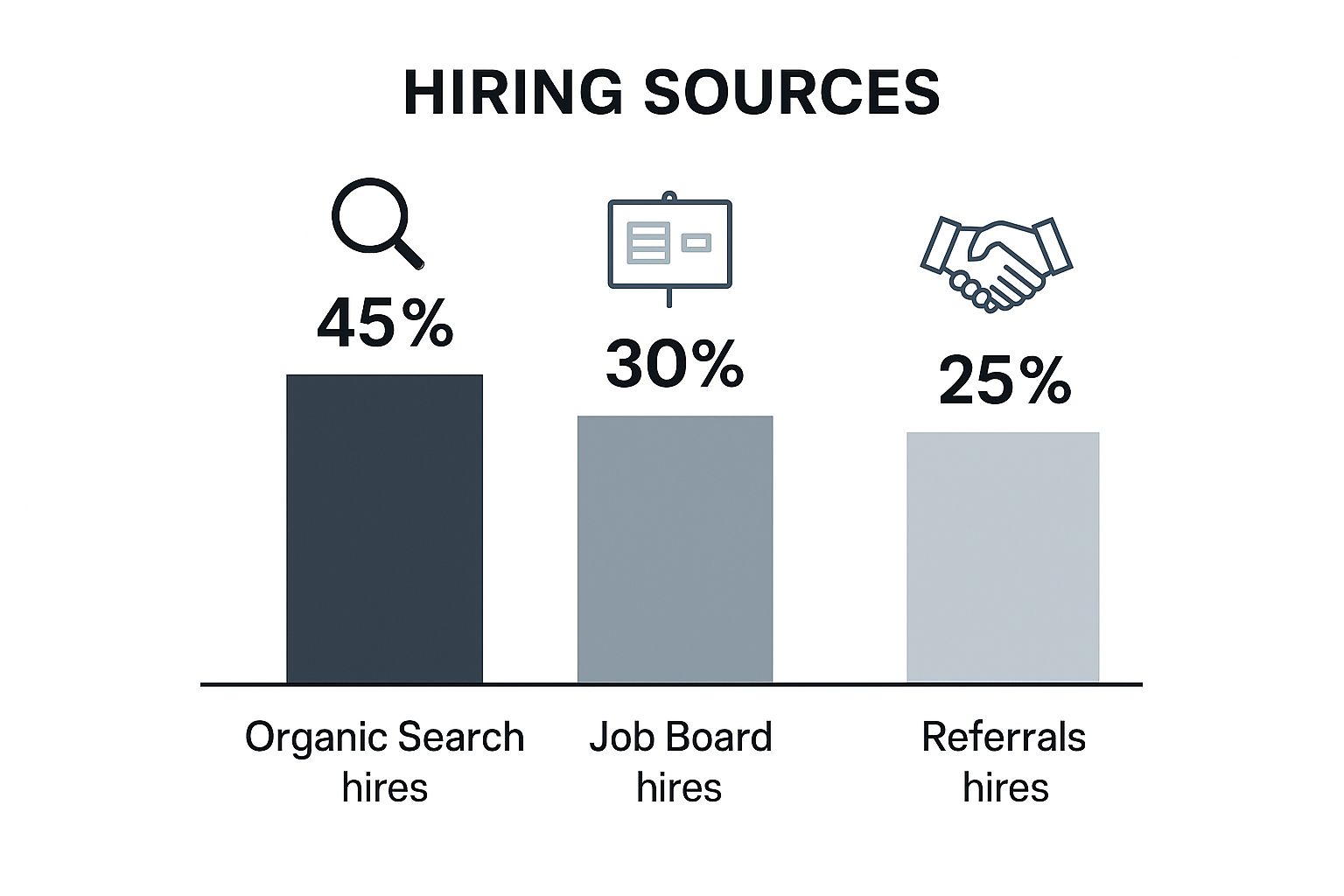A generic, off-the-shelf SEO strategy is actively hindering your recruitment agency. Why? Because you operate in a unique, two-sided marketplace, tasked with attracting both top-tier candidates and high-value clients. Specialized SEO for recruitment agencies isn't about casting a wide net and hoping for the best. It's a precise, strategic approach designed to pull in the right people for the right roles, setting you up for sustainable growth.
Why Your Agency Needs More Than Standard SEO
Most standard SEO plans are built around a simple goal: drive as much traffic as possible. While suitable for an e-commerce store, it's a flawed model for a recruitment agency. You aren't just selling a product; you're marketing career-defining opportunities to candidates while simultaneously selling your expertise to clients. This dual audience requires a much sharper, more focused strategy than a generic approach can provide.
Consider a tech recruitment firm using a broad keyword like "tech jobs." They are immediately competing with massive job boards like Indeed and LinkedIn, not to mention corporate career pages—a battle they are unlikely to win.
Now, imagine a competitor gets smart. They start targeting specific, high-intent phrases like "senior Java developer roles in fintech" or "hiring remote Python engineers." Suddenly, they’re no longer fighting the giants. They are connecting directly with the exact candidates and hiring managers they need to engage.
The Specialized Approach to Recruitment SEO
A specialized strategy centers on understanding user intent. A candidate searching for "how to write a software engineer resume" is in a different mindset than a hiring manager looking for "best executive search firms for CTOs." Your content, keywords, and entire website structure must be built to serve both journeys distinctly.
The core difference is this: a generic SEO plan chases high-volume keywords to boost overall traffic, while a recruitment-focused strategy targets niche, long-tail keywords to attract qualified candidates and decision-making clients.
This targeted method does more than just bring in traffic; it builds trust and positions your agency as the go-to authority within your specific niche.
To truly grasp the strategic shift needed, let's compare the two approaches side-by-side.
Recruitment SEO vs Generic SEO Strategies
This table illustrates that effective recruitment SEO isn't a minor adjustment but a fundamental rethinking of your digital strategy.
The data backs this up. The chart below shows how dominant organic search is for securing actual hires compared to other channels.

This isn't just a vanity metric. With nearly half of all hires potentially coming from organic search, a powerful SEO presence becomes a direct engine for placements and revenue.
Building Niche Authority for Long-Term Success
Ultimately, the goal is to establish your agency as a genuine thought leader. When you consistently provide real value to both candidates and clients through targeted, helpful content, you stop chasing leads. They start coming to you. This is where the true power of dedicated SEO for recruitment agencies really kicks in.
(If you need a quick refresher on the fundamentals, our general guide on why SEO is important is a great place to start before we dive deeper.)
Recent analysis only reinforces this. Studies show that recruitment-focused SEO agencies—those with deep industry knowledge and the agility to adapt to Google's constant changes—are the most effective. This specialization is absolutely critical because matching niche candidate skills with specific client demands is a world away from the simpler, sales-driven goals of typical SEO.
Finding Keywords That Attract Candidates and Clients

If you want your agency’s SEO to succeed, you have to move beyond guesswork. Real success comes from identifying the exact phrases your ideal candidates and your ideal clients are typing into Google.
It's tempting to go after broad, high-volume terms like "tech jobs near me," but that's a crowded and often fruitless battle. The real magic happens when you shift your focus to high-intent, long-tail keywords.
These are the longer, more descriptive search phrases that signal someone knows exactly what they're looking for. A candidate might search for a specific skill, while a client might be looking for a very particular type of hiring partner. By targeting these phrases, you stop shouting into the void and start having meaningful conversations with the right people.
Thinking in Dual Personas: Candidate vs. Client Keywords
Here’s where many agencies stumble: they treat all their website visitors the same. Your keyword strategy needs to serve two completely different audiences—talented professionals looking for their next role and hiring managers looking for their next great hire.
Let's break down how to approach each one:
- Candidate Keywords: These are all about the job seeker’s journey. They're searching for specific roles, career advice, and ways to get ahead. Your job is to meet them there with genuinely helpful content and relevant job listings.
- Client Keywords: These are about solving a business problem. Clients need to fill a role, and they’re looking for a specialist partner to make it happen. You need to show up as the expert solution they've been searching for.
Nailing this dual-path approach means every blog post, every service page, and every job description has a clear purpose and a specific audience in mind.
Uncovering High-Value Candidate Keywords
To build a strong talent pipeline, you have to get inside the head of a job seeker. This means going way beyond generic job titles. Think about the specific skills, software, and career questions that your ideal candidates are researching.
For instance, if your agency specializes in data science, you wouldn't just target "data scientist jobs." You’d dig deeper and build out content around keyword groups like these:
- Specific Skills: "python data analysis jobs," "machine learning engineer roles," "SQL for data science positions"
- Experience Levels: "entry-level data analyst remote," "senior data scientist jobs London"
- Certifications: "jobs for certified data analysts," "aws certified data analytics specialty careers"
- Informational Queries: "data analyst career path," "how to become a machine learning engineer"
Expert Tip: Don't overlook question-based keywords. Creating a resource that answers something like "what is the average salary for a data scientist in New York?" can attract top talent to your brand long before they’re actively applying. It builds incredible trust.
This level of detail ensures you're not just getting any candidates; you're attracting the ones with the specific, in-demand skills your clients will pay a premium for.
Finding Client-Focused Keywords That Convert
Now for the other side of the equation: attracting the companies that need to hire. These keywords have very little to do with job titles and everything to do with the services you offer and the problems you solve.
Let’s say your agency is a leader in fintech recruitment. Your client-focused keywords would be entirely different from your candidate ones:
- Service-Based: "fintech recruitment agency UK," "specialist financial technology recruiters," "executive search firm fintech"
- Problem-Oriented: "how to hire senior software engineers," "hard to fill tech roles," "recruiting for blockchain developers"
- Location-Specific: "IT staffing agency Boston," "tech headhunters San Francisco"
These are the terms used by decision-makers—the people with hiring authority and a budget. Ranking for these phrases is what fuels your business development and brings in new clients.
Putting It All Together: A Practical Keyword Plan
So, how do you find all these terms? You'll need a combination of smart thinking and the right tools. Platforms like Ahrefs or Semrush are indispensable for brainstorming ideas and checking data like monthly search volume and keyword difficulty.
Your final keyword list should be a balanced portfolio that serves your entire business. It should contain:
- Candidate-Intent Keywords: A healthy mix of job titles, specific skills, and informational questions.
- Client-Intent Keywords: A strategic blend of your services, the problems you solve, and key locations you serve.
When you get this balance right, your SEO efforts will work in harmony, building a robust talent pool and a consistent stream of new client leads. It creates a powerful, self-sustaining growth engine for your agency.
Creating Content That Builds Authority and Drives Action

Think of your keyword research as the blueprint; the content you create is the structure you build with it. For a recruitment agency, your content is your digital voice—a direct line to both top-tier candidates and high-value clients. It's what differentiates you from being seen as just another job board and becoming a trusted career partner.
Effective content in this space doesn't just fill a page; it has a job to do. It needs to answer questions, solve real problems, and showcase your deep expertise in the market. This is how you build genuine authority and convince both sides of the hiring equation that you're the only agency they need.
Structuring Job Descriptions for Peak SEO Performance
Your job descriptions are arguably the most important content on your website. Each one is a landing page for highly motivated candidates, so they must be perfectly optimized to capture that traffic. A sloppy, unstructured job post is a significant missed opportunity.
It all starts with a clear, SEO-friendly title. Ditch vague titles like "Software Engineer" for something more specific like "Remote Senior Frontend Engineer (React)." This immediately qualifies your audience and matches the long-tail searches that serious candidates use.
The body of the description needs to be scannable and genuinely helpful. Break it down with clear, useful headings:
- Responsibilities: Use action verbs and clearly outline the core duties. What will they do every day?
- Required Skills & Qualifications: List the absolute must-haves. Use the exact keywords for technologies, software, or certifications.
- Preferred Skills: Mention the nice-to-haves that could give a candidate an edge.
- What We Offer: Be transparent about the salary range, benefits, and company perks. This is a massive trust signal.
Treat every single job description as its own dedicated landing page. Include a compelling call-to-action (CTA) that encourages an immediate application. Make the "Apply Now" button big, bold, and impossible to miss. This simple focus can significantly improve your application rates.
For an extra edge, implement JobPosting schema markup. This snippet of code signals to Google that your page is a job opening, making it eligible for rich results in Google's job search features. It’s one of the fastest ways to boost visibility.
Moving Beyond Job Listings to High-Value Assets
While optimized job posts are great for attracting active candidates, building true, lasting authority means creating content that serves a much broader audience. These high-value content assets attract passive candidates, potential clients, and even your industry peers, cementing your position as a thought leader.
Here are a few ideas that work exceptionally well:
Comprehensive Salary Guides: Create detailed, data-backed guides for your specific niches, like a "2024 UK Marketing Salary Guide." This type of content is a magnet for candidates weighing their options and clients planning their budgets. It's also a natural link-builder.
Actionable Career Advice: Write articles that solve real-world problems for your candidates. Think about topics like "How to Nail the 5 Most Common Tech Interview Questions" or "Building a Design Portfolio That Actually Gets You Hired." This provides genuine value and keeps people coming back.
Insightful Hiring Trend Reports: Use your own placement data to create reports on market trends. An article on "The Rise of Contract Roles in Finance" demonstrates that you have your finger on the pulse and is incredibly valuable for client decision-makers.
This kind of strategic content demonstrates that you don't just fill roles—you understand the market inside and out. That's how you build a foundation of trust that pays off in the long run.
Using AI as a Co-Pilot, Not the Pilot
The rise of AI in content creation is impossible to ignore. For a busy agency, these tools can be a lifesaver for brainstorming blog post ideas, drafting outlines, or refining a clunky paragraph.
But here’s the key: your expertise is your biggest differentiator. Let AI handle 80% of the grunt work, but you must always apply that final 20% of human insight, industry knowledge, and your unique agency voice. Your personal experience and data-driven observations are things AI simply can't replicate.
The trend is clear. Recent research shows that demand for AI-related skills in SEO roles jumped by 21 percent in just one year. As detailed in the 2025 State of SEO Jobs Report, this signals a massive shift. For recruitment agencies, adopting AI-enhanced tools isn't just a novelty; it's a competitive advantage.
This "human-in-the-loop" approach ensures your content is not only optimized but also authentic, insightful, and authoritative—the perfect recipe for an effective SEO for recruitment agencies strategy.
Getting Your Website's Technical Foundation Right
You can have the most compelling job descriptions and insightful articles on the planet, but they’re completely useless if search engines can't find, crawl, and understand your website. This is where technical SEO comes in.
Think of it as the plumbing and wiring of your agency's site—it's not the part clients or candidates usually notice, but it's absolutely essential for everything else to work. A solid technical base ensures both Google and your users have a smooth experience. Without it, you’re building your entire SEO strategy on quicksand.
Make Site Speed a Non-Negotiable
In recruitment, speed is everything. A candidate might be scrolling through jobs on their lunch break, or a hiring manager could be quickly vetting agencies between meetings. A slow website isn't just an annoyance; it's a direct cause of lost business. A few seconds of delay can send a top-tier candidate or a high-value client straight to a competitor.
Google knows this, too. Site speed is a confirmed ranking factor for both desktop and mobile. Your agency’s site needs to be fast—period.
- Optimize Your Images: Large, uncompressed images are the usual suspects for slow load times. Always compress them before uploading.
- Use Caching: Browser caching stores parts of your site on a visitor's device, making it load almost instantly on their next visit.
- Clean Up Your Code: Bulky CSS and JavaScript files can really bog things down. Keep your code as lean as possible.
A fast site simply creates a better experience, leading to lower bounce rates and more time spent on your pages. These are all positive signals to Google, and they can have a real impact on your rankings over time.
Is Your Site Mobile-Friendly? (It’s Not a Suggestion)
The majority of job seekers—and a growing number of clients—are browsing on their phones. If your website is a mess on mobile, you're not just providing a bad experience; you're actively telling Google that you're not relevant to a huge portion of its users.
Google uses mobile-first indexing, which means it primarily looks at the mobile version of your site to determine its rankings. A clunky, hard-to-navigate mobile site will sink your SEO efforts across the board.
Your site needs to be fully responsive, meaning it automatically adjusts to fit any screen size. Text should be easy to read, buttons should be easy to tap, and your navigation should be simple and intuitive on a smaller screen.
Build a Logical Site Structure with Internal Linking
Think of your website's structure as a roadmap for both users and search engines. A well-organized site makes it easy for people to find what they're looking for, and it helps Google understand which pages are the most important.
Your most powerful pages (like your homepage or a comprehensive salary guide) should link out to other relevant pages on your site. This is called internal linking, and it's a great way to spread authority from your strongest pages to other important ones, like new job listings or service pages.
For example, a blog post about "interview tips for software developers" should absolutely link to your open software developer roles. It's a natural, helpful connection for the user, and it tells Google that these pages are related.
Measuring What Matters: Tracking Your SEO Success
You can't improve what you don't measure. To build a truly effective SEO strategy, you need to move beyond vanity metrics like raw traffic and focus on the numbers that actually impact your bottom line.
For a recruitment agency, this means tracking two things above all else: qualified candidate applications and new client leads. Everything else is just noise.
Setting Up Goal Tracking in Google Analytics 4
Google Analytics 4 (GA4) is your best friend for understanding how people are interacting with your site. You need to set up specific goals (called "conversions" in GA4) to track the actions that matter most to your business.
At a minimum, you should be tracking:
- Candidate Applications: Set up a conversion event for every time someone successfully submits a job application.
- Client Lead Forms: Track every submission of your "Contact Us" or "Request a Consultation" form.
- Phone Call Clicks: If you have a clickable phone number on your site, you can track how many people are calling you directly from your organic search results.
By tracking these specific actions, you can see exactly which pages and keywords are driving real business results. This is how you prove the ROI of your SEO efforts.
Using Google Search Console to Spot Opportunities
While GA4 is fantastic for seeing what people do once they're on your site, GSC tells you how you're performing in the Google search results themselves. It’s your window into your organic visibility.
Jump into GSC to check on a few critical things:
- Keyword Rankings: Are you actually moving up the ranks for your most important candidate and client keywords? Look for a steady upward trend in your average position.
- Click-Through Rate (CTR): If you're ranking high for a term but getting very few clicks, your title tag or meta description probably isn't grabbing anyone's attention. A low CTR is a huge red flag and often a quick fix with big returns.
Creating a Simple Monthly SEO Review Process
Having all this data is useless if you don't do anything with it. You need to carve out a little time each month to review your performance and decide what to do next. This doesn't need to be some complicated, all-day affair.
Your monthly check-in should be focused on answering three simple questions:
- What Worked? Pinpoint the articles, job pages, or keywords that brought in the most applications or client inquiries. Can you build on that success by creating similar content or targeting related keywords?
- What Didn't Work? Which pages are sitting dead in the water? Do they need a content refresh, better on-page optimization, or maybe just a completely new approach?
- What's Next? Based on your answers, what are your top 1-3 SEO priorities for the next 30 days? Keep it focused.
This straightforward, repeatable rhythm keeps your strategy from getting stale. It forces you to double down on what’s working and pivot away from what isn't, creating a powerful engine for real, long-term growth.
A Few Common Questions About SEO for Recruiters
How Long Until My Agency Sees SEO Results?
This is the most common question, and the honest answer is: it takes time. While you might see some small wins and flickers of movement within a few weeks, a properly executed SEO for recruitment agencies plan needs about 4-6 months to really gain traction and deliver meaningful results.
Think of it like building a reputation in the real world—it doesn't happen overnight. This timeframe gives Google enough time to recognize your new content, index your technical improvements, and start seeing the authority signals you're building. SEO is a long-term investment, and consistency is what separates the winners from the agencies that give up too soon.
Should Our SEO Target Candidates or Clients?
The simple answer is both. An effective SEO strategy doesn't force you to choose; it finds the sweet spot where the needs of both audiences overlap.
- For Candidates: You'll focus on keywords around specific job titles, skills, and career advice. This is how you build a deep, high-quality talent pool.
- For Clients: You'll go after terms like "specialist IT recruitment firm" or "executive search for finance roles." This is what brings in new business directly.
Pro Tip: The best content often serves both audiences simultaneously. Consider creating a detailed salary guide or an in-depth market analysis report for your niche. Candidates flock to it for career insights, and clients see it as proof of your expertise, establishing your agency as the go-to authority.
Can I Do Recruitment SEO Myself, or Do I Need to Hire an Expert?
You can absolutely get started on your own. Many of the fundamentals, like optimizing your job descriptions, keeping your Google Business Profile updated, and writing helpful blog posts, are completely manageable in-house. It’s a great way to get your feet wet. Just be sure to read up on some common SEO mistakes to avoid shooting yourself in the foot.
However, as you aim to compete in a crowded market, the complexity increases. Advanced strategies like technical SEO audits and sophisticated link-building campaigns are where a specialist agency can make a huge difference, often accelerating your growth and delivering a much stronger return on your investment.
Ready to build a powerful SEO strategy that attracts both top-tier candidates and high-value clients? The experts at Twelverays create data-driven campaigns that deliver measurable results. Schedule your free consultation today.





